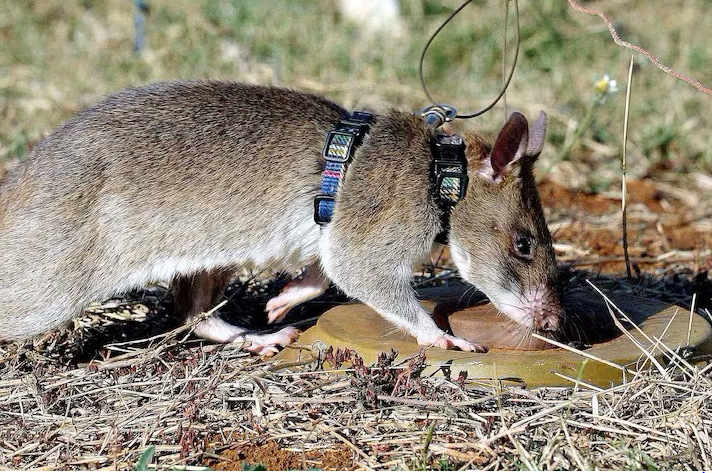Giant rats are now being trained to help curb the illegal wildlife trade by detecting items prized by traffickers, such as pangolin scales, ivory, rhino horns, and African blackwood.
African giant pouched rats have already proven successful in finding explosives and tuberculosis pathogens. According to a recent study, these rodents may offer a more cost-effective alternative to sniffer dogs in combating wildlife trafficking.
“Our research shows that we can train African giant pouched rats to detect illegal wildlife, even when it’s hidden among other materials,” said Dr. Isabelle Szott, researcher at the Okeanos Foundation and co-author of the study published in Frontiers in Conservation Science.
“The rats could still identify wildlife targets even after long gaps without exposure to that species,” added co-author Dr. Kate Webb, assistant professor at Duke University.
In fieldwork settings, these rats will wear vests with a small ball attached to their chest that, when pulled, emits a beeping sound. This way, they alert their handlers when a target is detected.
The global wildlife trafficking market is valued at approximately $23 billion annually, threatening both wildlife species and ecosystems.
Dr. Szott believes these trained rats could soon make a difference at transportation hubs worldwide, including in the Middle East and North Africa, where traffickers smuggle illegal wildlife products like ivory and tusks.
“I think that once these rats achieve their first ‘bust,’ their demand will grow quickly,” Dr. Szott.
At Tanzania’s APOPO Training and Research Centre, these rats nicknamed Kirsty, Marty, Attenborough, Irwin, Betty, Teddy, Ivory, Ebony, Desmond, Thoreau, and Fossey underwent a staged training process. Their first task involved holding their noses over a hole with the target scent for several seconds. Correct behavior was rewarded with flavored rodent pellets.
The rats were also exposed to common masking scents used by traffickers, such as coffee beans, washing powder, and electric cables, to hone their scent detection skills.
Their scent memory is impressive: the rats could recognize scents they hadn’t encountered for five to eight months, showing cognitive abilities similar to those of trained dogs.
This proof-of-concept study suggests that rats could soon be deployed by enforcement agencies around the world, with France and Singapore already showing interest.
Eventually, the rats will be trained to search hard-to-reach areas where wildlife trafficking frequently occurs, like cargo holds in international ports.
The team has also developed custom vests with a small ball containing a microswitch that beeps when activated, allowing handlers to know when a target is detected.
“These vests are a fantastic example of hardware that could be applied in various environments, from shipping ports to detecting smuggled wildlife,” said Dr. Webb.





